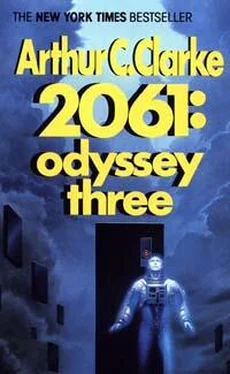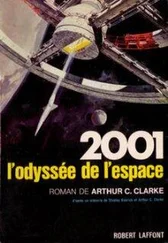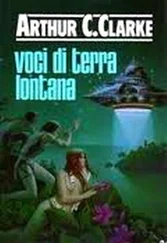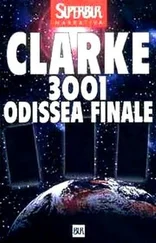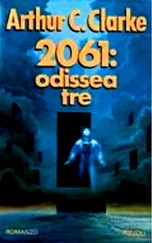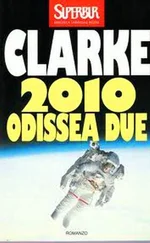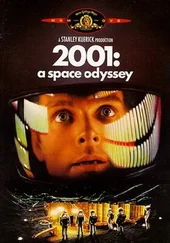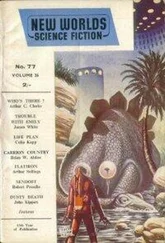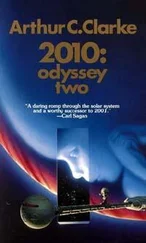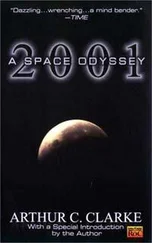Arthur Clarke - 2061 - Odyssey Three
Здесь есть возможность читать онлайн «Arthur Clarke - 2061 - Odyssey Three» весь текст электронной книги совершенно бесплатно (целиком полную версию без сокращений). В некоторых случаях можно слушать аудио, скачать через торрент в формате fb2 и присутствует краткое содержание. Жанр: Фантастика и фэнтези, на английском языке. Описание произведения, (предисловие) а так же отзывы посетителей доступны на портале библиотеки ЛибКат.
- Название:2061: Odyssey Three
- Автор:
- Жанр:
- Год:неизвестен
- ISBN:нет данных
- Рейтинг книги:3 / 5. Голосов: 1
-
Избранное:Добавить в избранное
- Отзывы:
-
Ваша оценка:
- 60
- 1
- 2
- 3
- 4
- 5
2061: Odyssey Three: краткое содержание, описание и аннотация
Предлагаем к чтению аннотацию, описание, краткое содержание или предисловие (зависит от того, что написал сам автор книги «2061: Odyssey Three»). Если вы не нашли необходимую информацию о книге — напишите в комментариях, мы постараемся отыскать её.
2061: Odyssey Three — читать онлайн бесплатно полную книгу (весь текст) целиком
Ниже представлен текст книги, разбитый по страницам. Система сохранения места последней прочитанной страницы, позволяет с удобством читать онлайн бесплатно книгу «2061: Odyssey Three», без необходимости каждый раз заново искать на чём Вы остановились. Поставьте закладку, и сможете в любой момент перейти на страницу, на которой закончили чтение.
Интервал:
Закладка:
'Of course, I do,' laughed Floyd. 'I've seen the analyses – just a few parts in a million. Nothing to worry about, But I did have one surprise,' he added ruefully.
'And what was that?'
'If you could ship this stuff back to Earth, you could make a fortune selling it as Halley's Patent Purgative.'
34 – Car Wash
Now that they were committed, the whole atmosphere aboard Universe had changed. There was no more argument; everyone was cooperating to the utmost, and very few people had much sleep for the next two rotations of the nucleus – a hundred hours of Earth time.
The first Halley 'day' was devoted to a still rather cautious tapping of Old Faithful, but when the geyser subsided towards nightfall the technique had been thoroughly mastered. More than a thousand tons of water had been taken aboard; the next period of daylight would be ample for the rest.
Heywood Floyd kept out of the Captain's way, not wishing to press his luck; in any event, Smith had a thousand details to attend to. But the calculation of the new orbit was not among them; that had been checked and rechecked on Earth.
There was no doubt, now, that the concept was brilliant, and the savings even greater than Jolson had claimed. By refuelling on Halley, Universe had eliminated the two major orbit changes involved in the rendezvous with Earth; she could now go straight to her goal, under maximum acceleration, saving many weeks. Despite the possible risks, everyone now applauded the scheme.
Well, almost everyone.
On Earth, the swiftly organized 'Hands off Halley!' society was indignant. Its members (a mere 236, but they knew how to drum up publicity) did not consider the rifling of a celestial body justified, even to save lives. They refused to be placated even when it was pointed out that Universe was merely borrowing material that the comet was about to lose anyway. It was, they argued, the principle of the thing. Their angry communiqués gave much needed light relief aboard Universe.
Cautious as ever, Captain Smith ran the first low-powered tests with one of the attitude-control thrusters; if this became unserviceable, the ship could manage without it, There were no anomalies; the engine behaved exactly as if it was running on the best distilled water from the lunar mines.
Then he tested the central main engine, Number One; if that was damaged, there would be no loss of manoeuvrability – only of total thrust. The ship would still be fully controllable, but, with the four remaining outboards alone, peak acceleration would be down by twenty per cent.
Again, there were no problems; even the sceptics started being polite to Heywood Floyd, and Second Officer Jolson was no longer a social outcast.
The lift-off was scheduled late in the afternoon, just before Old Faithful was due to subside. (Would it still be there to greet the next visitors in seventy-six years' time? Floyd wondered. Perhaps; there were hints of its existence even back on the 1910 photographs.)
There was no countdown, in the dramatic oldtime Cape Canaveral style. When he was quite satisfied that everything was shipshape, Captain Smith applied a mere five tons of thrust on Number One, and Universe drifted slowly upwards and away from the comet.
The acceleration was modest, but the pyrotechnics were awe-inspiring – and, to most of the watchers, wholly unexpected. Until now, the jets from the main engines had been virtually invisible, being formed entirely of highly ionized oxygen and hydrogen. Even when – hundreds of kilometres away – the gases had cooled off enough to combine chemically, there was still nothing to be seen, because the reaction gave no light in the visible spectrum.
But now, Universe was climbing away from Halley on a column of incandescence too brilliant for the eye to look upon; it seemed almost a solid pillar of flame. Where it hit the ground, rock exploded upwards and outwards; as it departed for ever, Universe was carving its signature, like cosmic graffiti, across the nucleus of Halley's Comet.
Most of the passengers, accustomed to climbing spacewards with no visible means of support, reacted with considerable shock. Floyd waited for the inevitable explanation; one of his minor pleasures was catching Willis in some scientific error, but this very seldom happened. And even when it did, Willis always had some very plausible excuse.
'Carbon,' he said. 'Incandescent carbon – exactly as in a candle flame – but slightly hotter.'
'Slightly,' murmured Floyd.
'We're no longer burning – if you'll excuse the word -, (Floyd shrugged his shoulders) 'pure water. Although it's been carefully filtered, there's a lot of colloidal carbon in it. As well as compounds that could only be removed by distillation.'
'It's very impressive, but I'm a little worried,' said Greenburg. 'All that radiation – won't it affect the engines – and heat the ship badly?'
It was a very good question, and it had caused some anxiety. Floyd waited for Willis to handle it; but that shrewd operator bounced the ball right back to him.
'I'd prefer Dr Floyd to deal with that – after all, it was his idea.'
'Jolson's, please. Good point, though. But it's no real problem; when we're under full thrust, all those fireworks will be a thousand kilometres behind us. We won't have to worry about them.'
The ship was now hovering some two kilometres above the nucleus; had it not been for the glare of the exhaust, the whole sunlit face of the tiny world would have been spread out beneath. At this altitude – or distance – the column of Old Faithful had broadened slightly. It looked, Floyd suddenly recalled, like one of the giant fountains ornamenting Lake Geneva. He had not seen them for fifty years, and wondered if they still played there.
Captain Smith was testing the controls, slowly rotating the ship, then pitching and yawing it along the Y and Z axes. Everything seemed to be functioning perfectly.
'Mission time zero is ten minutes from now,' he announced. '0.1 gee for fifty hours; then 0.2 until turnaround – one hundred and fifty hours from now.' He paused to let that sink in; no other ship had ever attempted to maintain so high a continuous acceleration, for so long. If Universe was not able to brake properly, she would also enter the history books as the first manned interstellar voyager.
The ship was now turning towards the horizontal – if that word could be used in this almost gravityless environment – and was pointing directly to the white column of mist and ice crystals still steadily spurting from the comet. Universe started to move towards it -
'What's he doing?' said Mihailovich anxiously.
Obviously anticipating such questions, the Captain spoke again. He seemed to have completely recovered his good humour, and there was a hint of amusement in his voice.
'Just one little chore before we leave, Don't worry – I know exactly what I'm doing. And Number Two agrees with me – don't you?'
'Yessir – though I thought you were joking at first.'
'What is going on up on the bridge?' asked Willis, for once at a loss.
Now the ship was starting a slow roll, while still moving at no more than a good walking speed towards the geyser. From this distance – now less than a hundred metres – it reminded Floyd still more closely of those far-off Geneva fountains.
Surely he's not taking us into it – But he was. Universe vibrated gently as it nuzzled its way into the rising column of foam. It was still rolling very slowly, as if it was drilling its way into the giant geyser. The video monitors and observation windows showed only a milky blankness.
The whole operation could not have lasted more than ten seconds; then they were out on the other side. There was a brief burst of spontaneous clapping from the officers on the bridge; but the passengers – even including Floyd – still felt somewhat put-upon.
Читать дальшеИнтервал:
Закладка:
Похожие книги на «2061: Odyssey Three»
Представляем Вашему вниманию похожие книги на «2061: Odyssey Three» списком для выбора. Мы отобрали схожую по названию и смыслу литературу в надежде предоставить читателям больше вариантов отыскать новые, интересные, ещё непрочитанные произведения.
Обсуждение, отзывы о книге «2061: Odyssey Three» и просто собственные мнения читателей. Оставьте ваши комментарии, напишите, что Вы думаете о произведении, его смысле или главных героях. Укажите что конкретно понравилось, а что нет, и почему Вы так считаете.
